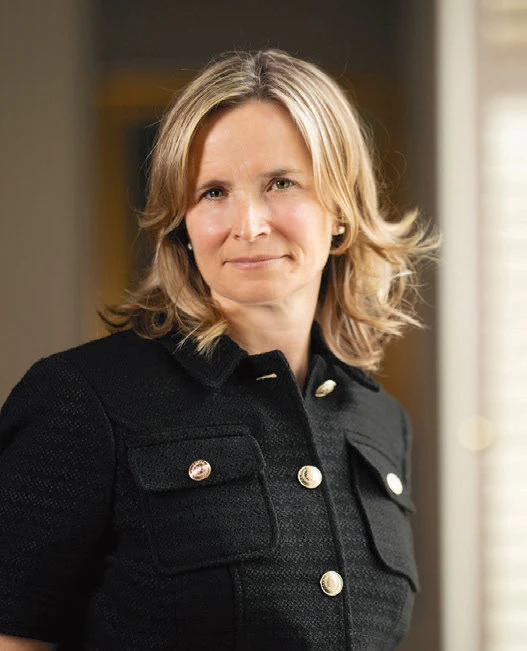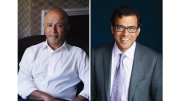Physician-Writers on the Podium
A pair of prominent physician-authors will be the speakers at the 374th Commencement, on May 29, and on Alumni Day, June 6. Abraham Verghese, a physician and writer who is Meier and Lane provostial professor of medicine at Stanford University, is the featured guest on Commencement morning. He completed his medical residency in Johnson City, Tennessee, where he subsequently became aware of the arrival of HIV/AIDS in rural America—the subject of his first book, a memoir titled My Own Country: A Doctor’s Story (1994). It recounts the increasing prevalence of the disease among the local gay community, the difficulties of caring for a stigmatized population, and the challenges of delivering medicine humanely in the U.S. healthcare system. The latter themes have characterized his practice, teaching, and writing in the decades since. He has written that his Tennessee experience taught him the difference between healing and curing: “One can be healed even when there is no cure, by which I mean a coming to terms with the illness, finding some level of peace and acceptance in such a terrible setting; this is something a physician can, if they are lucky, help facilitate.” Read more at harvardmag.com/commencement-speaker-25.
Atul Gawande, M.D. ’95, M.P.H. ’99, former professor of health policy and management at Harvard’s T.H. Chan School of Public Health and Thier professor of surgery at Harvard Medical School, will address fellow alumni on June 6. Most recently the U.S. Agency for International Development’s assistant administrator for global health, Gawande in 2012 cofounded Ariadne Labs as a hub for innovation in healthcare systems and delivery. He is best known to the public for his New Yorker reporting and his books, including Complications: A Surgeon’s Notes on an Imperfect Science (2002). Learn more at harvardmag.com/alumni-day-speaker-25.
Toehold in Allston
As construction of the enterprise research campus proceeds in Allston, across Western Avenue from Harvard Business School, a first tenant for the office/laboratory towers has been identified. Roche, the pharmaceutical company, announced in March that it would locate a Roche Genentech Innovation Center, focused on cardiovascular, renal, and metabolism research, at the site, with the possibility of employing up to 500 people. The initial lease covers 30,000 square feet of space (this phase of the campus includes 444,000 square feet of office/lab facilities, plus residential towers, a Harvard conference center, and a hotel). Although developers (in this case, Tishman Speyer) love to announce anchor tenants who lease a substantial portion of new buildings, this toehold may be welcome news in the Greater Boston market where both office and laboratory vacancy rates exceed 20 percent. Read a full report at harvardmag.com/allston-roche-25.
Bond Offering
The University on February 27 filed a preliminary offering statement for $450 million of tax-exempt bonds to be issued through the Massachusetts Development Finance Agency—a routine sort of borrowing for Harvard’s long-term, and substantial, building needs, at a time when interest rates were declining sharply. Less routine was the language in the “additional considerations” section in an appendix, which referred to the potential impact of “numerous conditions and events,” including “actions at the federal level that may have the direct or indirect effect of reducing federal support for the University’s research costs including facilities and administrative overhead,…increasing taxes, or other costs borne by the University, or otherwise adversely affecting the section 501(c)(3) status or other tax benefits accorded to the University.” It also cited the federal guidance outlawing diversity programs, and more (see page 15 and harvardmag.com/finances-risk-25). Moody’s and Standard and Poor’s nonetheless maintained their triple-A credit ratings for Harvard’s debt.
Undergraduate Admissions News
Reversing a historic disparity, Yale plans to expand undergraduate classes by 100 students per year beginning with the cohort matriculating this fall. The increase follows a 2017 expansion effected after the construction of two additional residential colleges (as Houses are known in New Haven). Yale’s new class size, 1,650 students, will over time bring enrollment to slightly more than Harvard’s: the Crimson have aimed for 1,640 undergraduates annually. To support the larger student body, the Elis continue to add faculty members: having allocated 45 new positions in 2022, and now five more, Yale aims for more than 750 tenured and tenure-track professors—presumably funded by the current $7-billion For Humanity campaign. (Harvard’s equivalent Arts and Sciences faculty ranks now number 730.)…Separately, Yale broke the $90,000 barrier, posting a $90,550 annual undergraduate term bill for next fall. It reported that 58 percent of first-year members of the class of 2028 received need-based financial aid, totaling an average annual award of $74,000. Read about Harvard College’s March decision to boost and restructure financial aid in “Back to Basics” (this issue).
Around Higher Ed
The 10-year run of Harvard’s popular introductory course Computer Science 50, as part of the Yale curriculum where it was offered online, has ended. The New Haven edition was backed by a donor grant to defray the cost of multiple teaching assistants; that funding ran out, so the Eli version has been wound down. Having doubled its computer science faculty during the past decade, Yale expects to deploy its own suite of introductory courses.…Brown University announced the conclusion of its capital campaign, which raised $4.4 billion; the gifts have underwritten loan-free undergraduate financial aid, international need-blind admissions, and 143 endowed professorships.
Campus Newsmakers
Bae Family professor of government Taeku Lee (a scholar of racial and ethnic politics, and president of the American Political Science Association) and Shirley Lee (a primary school teacher and education researcher) have been appointed faculty deans of Dunster House beginning July 1. They succeed Sean D. Kelly, Martignetti professor of philosophy and dean of arts and humanities, and Cheryl Chen, senior lecturer on philosophy, whose House service began in 2017.…Wyss professor of biologically inspired engineering Jennifer Lewis has been awarded the National Academy of Sciences’ 2025 James Prize in Science and Technology Integration, which recognizes interdisciplinary research. Her work on developing artificial kidney tissue was featured in “Building Toward a Kidney” (January-February 2017, page 37).…Ann Marie Lipinski, NF ’90, curator of the Nieman Foundation for Journalism since 2011 (and a valued former member of this magazine’s Board of Directors), will step down at the end of this academic year. Read more about the Pulitzer Prize-winning journalist and former editor of the Chicago Tribune at harvardmag.com/nieman-25.

Education Dean
Nonie K. Lesaux, interim dean of the Harvard Graduate School of Education since last July, was appointed dean in March. The Larsen professor of education and human development was previously academic dean and director of doctoral studies. Her research has focused on improved literacy. Read more at harvardmag.com/lesaux-hgse-dean.
Alumni Headliners
Mark J. Carney ’87, former governor of the Bank of Canada and the Bank of England, elected a member of the Board of Overseers in 2021, relinquished that role in March upon being elected by the Liberal Party as the next prime minister of Canada, succeeding Justin Trudeau.…Theodore D. Chuang ’91, J.D. ’94, a United States district judge and an Overseer elected in 2024, found himself in the headlines as he ruled on a lawsuit by U.S. Agency for International Development employees and contractors challenging Elon Musk and the Department of Government Efficiency over the latter’s order to shut down the agency and dismiss most of its personnel.…Former Overseer Helen M. Blau, Ph.D. ’75, Baxter Foundation professor at Stanford, where she directs the stem cell biology laboratory, was awarded the National Medal of Science by then-President Joe Biden on January 3.…Martín Escobari ’94, M.B.A. ’98, co-president of General Atlantic, a private equity firm which manages more than $100 billion of assets, has been elected to the board of directors of Harvard Management Company.









